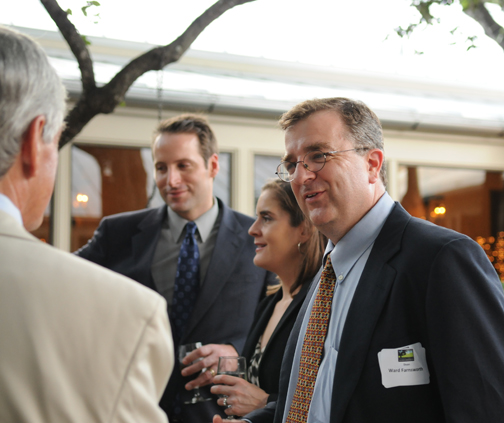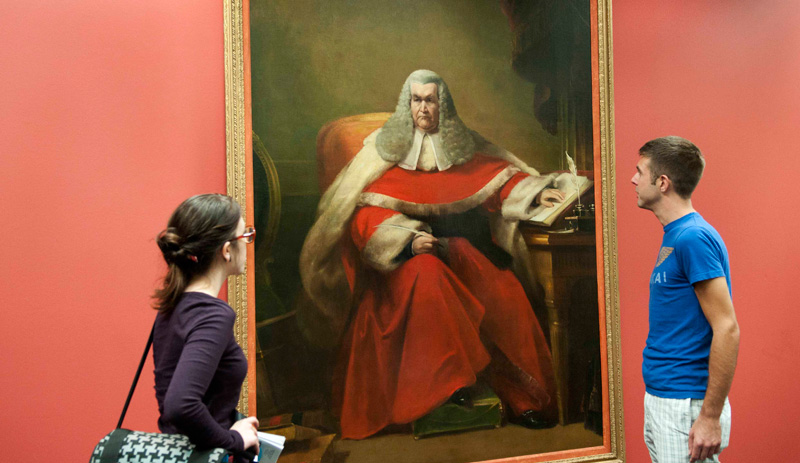-
September 28, 2012
Sister Helen Prejean to speak about the death penalty in the United States, October 11, 2012
Sister Helen Prejean, a member of the Congregation of Joseph and author of the book, Dead Man Walking: An Eyewitness Account of the Death Penalty in the United States, will discuss the death penalty on October 11, 2012, at 2:00 p.m. in the Law School’s Eidman Courtroom. The event is free and open to the public. -

September 28, 2012
Dean Ward Farnsworth traveled to San Antonio on September 28, 2012, to visit with Law School alumni. -
September 28, 2012
On Tuesday, October 30, 2012, the University of Texas School of Law’s William Wayne Justice Center for Public Interest Law and Career Services Office will present speaker Vanita Gupta, deputy legal director of the American Civil Liberties Union and Director of the ACLU’s National Campaign to End Overincarceration. Gupta has been involved in several significantTexascases. -
September 27, 2012
Faculty and eight students from the University of Texas School of Law’s Supreme Court Clinic will travel to Washington, D.C., to hear oral arguments in one of their current cases, Fane Lozman v. The City of Riviera Beach, Florida, on Monday, October 1, 2012, the opening of the United States Supreme Court’s current term. The case will be argued by David C. Frederick, ’89, codirector of the Supreme Court Clinic and partner at Kellogg, Huber, Hansen, Todd, Evans & Figel PLLC, in Washington, D.C. This will be Frederick’s thirty-eighth argument before the Court. -
September 27, 2012
Law School helps launch Travis County Model Court Education Advocacy Pilot Project
The Law School’s William Wayne Justice Center for Public Interest Law and Children’s Rights Clinic have helped develop a multi-stakeholder pilot education reform project focused on youth entering the child welfare system in Travis County. The Education Advocacy Pilot Project, an initiative of the Travis County Model Court for Children and Families, launched last week and will continue through the 2012–2013 school year. -
September 26, 2012
Meg Clifford, ’12, joins Justice Center as “School-to-Prison Pipeline” project research fellow
The Law School’s William Wayne Justice Center for Public Interest Law is partnering with the UT Division of Diversity and Community Engagement (DDCE) to fund a two-year research fellow to work on a new “School-to-Prison Pipeline” project. Meg Clifford, ’12, has been selected for the position. -
September 24, 2012
John Paul Stevens, who retired in 2010 after serving as an associate justice of the U.S. Supreme Court for thirty-four years, , has written an extensive review of Professor Sanford Levinson’s latest book, Framed: America’s Fifty-one Constitutions and the Crisis of Governance (Oxford University Press, 2012), in the October 11, 2012, edition of The New York Review of Books. -
September 21, 2012
The Bernard and Audre Rapoport Center for Human Rights and Justice will present the first fall lecture in its Human Rights Happy Hour Speaker Series on September 25. Professor James Gibson of Washington University in St. Louis, will present a talk called “Electing Judges: The Surprising Effects of Campaigning on Judicial Legitimacy.” The event, which is free and open to the public, will take place on Tuesday, September 25, from 3:45 p.m.–5:45 p.m., in the Sheffield Room (TNH 2.111) at the University of Texas School of Law. -
September 19, 2012
Federal prosecutor to speak about human trafficking, September 27, 2012
Robert Moossy, acting section chief of the Criminal Section of the Civil Rights Division of the U.S. Department of Justice, will speak about human trafficking on Thursday, September 27, from noon–1:00 p.m. in the Law School’s Eidman Courtroom. He will address federal initiatives, national policy, and best practices to end human trafficking. The event is free and open to the public. -

September 17, 2012
For more than half a century, students at the Law School have enjoyed the Hyder Collection—thousands of legal-related art pieces on semi-permanent loan and displayed throughout the school that, in addition to their aesthetic value, have served to provide a social and historical context for the study of the law. Now, thanks to the efforts of many, a large part of that collection has found a permanent home at the school. -
September 10, 2012
Actors from Spirit of Shakespeare, a University of Texas student organization, will perform scenes from The Merchant of Venice as part of a panel discussion titled “Is that the Law?: Shakespeare’s The Merchant of Venice,” on Friday, September 28, 2012, in the Eidman Courtroom at the University of Texas School of Law from 6:30 p.m. to 9:30 p.m. The event, free and open to the public, is sponsored by the Department of English at the University of Texas at Austin and the University of Texas School of Law. -
September 7, 2012
The University of Texas Law School Foundation Board of Trustees announces the election of John H. Massey, '66, of Dallas and Columbus, Texas as its new president. Mr. Massey assumed the presidency on September 1, 2012.
